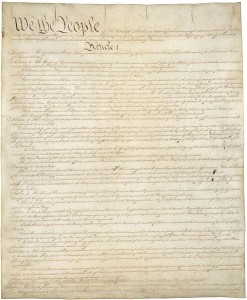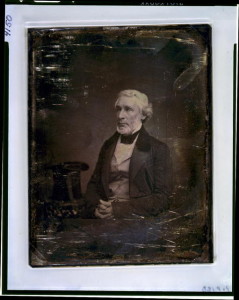Inter arma leges silent. [1]
As the 37th Congress closed on March 4, 1863 Northerners were aware that Congress had recently granted the President greatly increased power in order to put down the rebellion and restore the Union. Both the New York Herald and Harper’s Weekly referred to the dictatorial powers of Abraham Lincoln, but both were supportive of the enacted laws because of the demands of the war. (the Herald editorial was reproduced through the filter of the Richmond Daily Dispatch)
Here are some excerpts from the March 14, 1863 issue of Harper’s Weekly (hosted at Son of the South:
THE WORK DONE BY CONGRESS.
THE Thirty-seventh Congress of the United States has expired, having, in the short session which ended on March 4, passed some of the most momentous measures ever placed upon the statute-book. Those measures, as a whole, are equivalent to the step which, in republican Rome, was taken whenever the state was deemed in imminent danger, and which history calls the appointment of a Dictator. The President of the United States has, in effect, been created Dictator, with almost supreme power over liberty, property, and life—a power nearly as extensive and as irresponsible as that which is wielded by the Emperors of Russia, France, or China. And this is well. To succeed in a struggle such as we are waging a strong central Government is indispensable. One great advantage which the rebels have had over us is the unity of their purposes, and the despotic power of their chief. We are now on a par with them in these respects, and we shall see which is the better cause.
The measures which collectively confer upon Mr. Lincoln dictatorial powers consist, 1st, of the Conscription Act; 2d, of the Finance measures; and, 3d, of the Indemnity Act.
After reviewing the Conscription and Banking acts the article discusses the Indemnity Act or Habeas Corpus Suspension Act 1863
It is quite evident that in the face of such a state of things, and when the nation is engaged in a death-grapple of which the issue is very doubtful, the slow and cautious remedies which the law provides for the redress of wrongs in time of peace would be out of place. The country might be ruined while we were empanneling a jury to try a traitor. Inter arma leges silent.
When we undertook the war we tacitly agreed to accept it with all its evils. Prominent among these are a depreciated currency, a temporary deprivation of personal liberty, and a liability to be taken from one’s business to carry a musket in the army. These are grave inconveniences. But they are temporary and bearable; whereas the evils which would result from the disruption of the Union are lasting and intolerable. We may suffer, but our children will benefit by our suffering. Whereas if this country is severed in twain the future which lies before us is plainly depicted in the history of Mexico and Central America: incessant wars, constant subdivisions, a cessation of honest industry and agriculture, a decay of trade, a disappearance of wealth and civilization, and in their stead chronic strife, rapine, bloodshed, and anarchy. To avoid these things we can well afford for a few years to have a strong Government.
In supporting the temporary dictatorship the New York Herald seemed to rely on the character of Abraham Lincoln and the character of the Union troops in the field.
From the Richmond Daily Dispatch March 4, 1863:
The Herald on Abraham Lincoln as a Dictator — Bennett on his Knees to the future [C]zar of the United States.
The New York Herald, of the 27th, has the following article on Abraham’s prospects for the Dictatorship of the United States:
The important measures which have lately passed, and others which are now under consideration in the two houses of Congress, will leave no excuse for a failure on the part of the present Administration to put an end to the rebellion. With the closing of the present session President Lincoln will be practically invested with the powers of a Dictator. …
This organic instrument and the laws passed in pursuance thereof constitute the supreme law of the land. Nor do we think it can be successfully denied or contested that in straining its warlike authority to the establishment at Washington of a temporary dictatorship, Congress has in the acts indicated passed the barriers of the Constitution. The legislative power of Congress in regard to the militia, in case of rebellion or invasion, and over the financial affairs of the country, and the habeas corpus, is broad and comprehensive. It is possible that with a Napoleon or a Cromwell, clothed with this provisional dictatorship, there would be an end of our Republican institutions and the beginning of an imperial establishment; but there is not the slightest danger of the abuse of his authority by President Lincoln for ambitious purposes. We all know that his ambition is limited to the suppression of the rebellion, but if he were not, we all know that he would be powerless to employ the intelligent, liberty loving soldiers of the Union in any movement involving the suppression of our regular Presidential election. …
It made me nervous when I read William Green’s letter home from the Virginia front talking about how powerful the Administration was. When he wrote, “individuals are nothing before a vital principle” I thought that was a pretty good motto for Adolf Hitler’s Nazi program. But Bennett from the Herald would rely on another one of Green’s statements – “… the Administration. I say support it to the letter so long as the present one exists, and at another election, if it doesn’t suit, change it.”
- [1]translated ” in the midst of arms (i.e., in time of war) the laws are silent”↩


